Restorase® DNA Polymerase
Our Restorase® DNA Polymerase (R1028) is a specialty enzyme designed to facilitate repair and provide reliable amplification of damaged DNA. Extensive manipulation of DNA that results from archived samples, aged museum specimens, or samples from phenol/chloroform extraction, causes damage that interferes with accurate amplification during PCR. Restorase was developed for researchers unable to achieve amplification of damaged DNA templates when using other commercially available DNA polymerases. The ability to restore damaged or degraded DNA enables researchers to work with damaged templates that would otherwise be abandoned.
Restorase® DNA Polymerase, with 10x Reaction Buffer, combines Sigma's long and accurate enzyme technology with a DNA repair enzyme. This optimized blend will initiate the repair and further amplify damaged DNA templates greater than 100 base pairs.
- Repair DNA damaged as a result of harsh treatment or long-term storage
- Restore amplification of degraded DNA
- Initiate repair of damaged DNA template as small as 100 base pairs
DNA templates are compromised when damaged by exposure to acid, alkylating agents, heat or light. These damages block the progression of DNA polymerases, thereby affecting PCR efficiency. Restorase functions by modifying the damaged sites allowing polymerization and subsequent template copying. Restorase provides a new opportunity to amplify templates that would otherwise be unamplifiable.
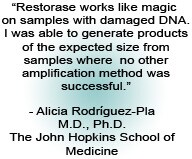
Repair Damaged DNA
Damage to your DNA template can occur during improper storage, aging, freeze-thawing, or exposure to acid, heat or light. This will adversely affect PCR because the damage will block the progression of the DNA polymerase. Restorase will repair the damage and restore amplification.
Rescue of formic acid damaged lambda template
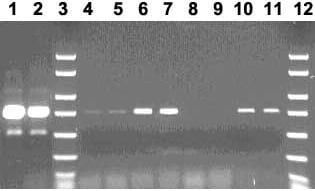
Gel and Sequence Analysis of Rescued DNA
Lambda DNA was damaged with formic acid for 7.5 or 10 minutes. Damaged DNA was amplified with Taq DNA polymerase or Restorase® DNA polymerase. Damaged DNA was also sequenced before and after Restorase® amplification.
Lanes 1,2: Undamaged l DNA
Lanes 3, 12: PCR marker
Lanes 4,5: l DNA with 7.5 min formic acid, Taq
Lanes 6,7: l DNA with 7.5 min formic acid, Restorase
Lanes 8,9: l DNA with 10 min formic acid, Taq
Lanes 10,11: l DNA with 10 min formic acid, Restorase
Genetic researchers, evolutionary biologists, and forensic scientists depend on high quality sequencing data to accurately determine identity, track evolutionary changes across generations, and identify genetic mutations that cause disease. The following data shows the recovery of damaged DNA by Restorase® to allow for precise sequencing analysis, which is one of the most important benefits of Restorase®.
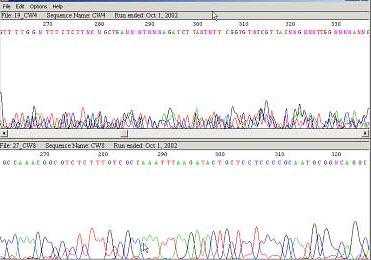
Sequence analysis of l DNA damaged with formic acid treatment and amplified with standard high fidelity enzyme
Sequence analysis of the same template rescued by Restorase® DNA Polymerase
Reliable Amplification of Damaged DNA
Amplification of 407 bp of cytochrome oxidase was restored from 30 year-old moth legs using Restorase® and other commercially available thermostable polymerases.
Rescued 30-year old archived moth DNA
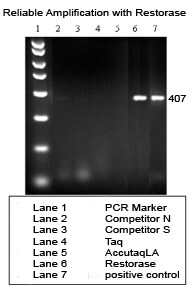
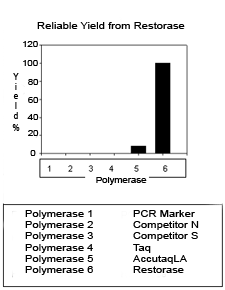
Amplification of cytochrome oxidase (407 bp) from fresh and 30-year old moth legs using Restorase® and commonly used thermostable polymerases.
Restorase® preincubation was: 37 °C for 20 minutes, 72 °C for 5 minutes, 94 °C for 2 minutes followed by primer addition (4 °C) and amplification. All amplifications were 45 cycles of 94 °C for 5 sec, 51 °C for 30 sec and 72 °C for 60 seconds in supplier recommended buffers. Taq DNA Polymerase (D1806) was used to amplify the fresh moth leg control.
The DNA was isolated using GenElute™ Mammalian Genomic DNA Purification Kit (G1N10). The archived 30-year old museum sample was a single moth leg while the fresh DNA was isolated from an entire moth.
Materials
Purchase of this product is accompanied by a limited license for use in the Polymerase Chain Reaction (PCR) process for research purposes only and in conjunction with a thermal cycler whose use in the automated performance of the PCR process is covered by an up-front license fee, either by payment to Applied Biosystems or as purchased, i.e., and authorized thermal cycler. Licensed under U.S. Patent Number 5,436,149 owned by Takara Shuzo Co., Ltd.
Restorase® is a registered trademark of Sigma-Aldrich Corporation. Patent pending.
To continue reading please sign in or create an account.
Don't Have An Account?